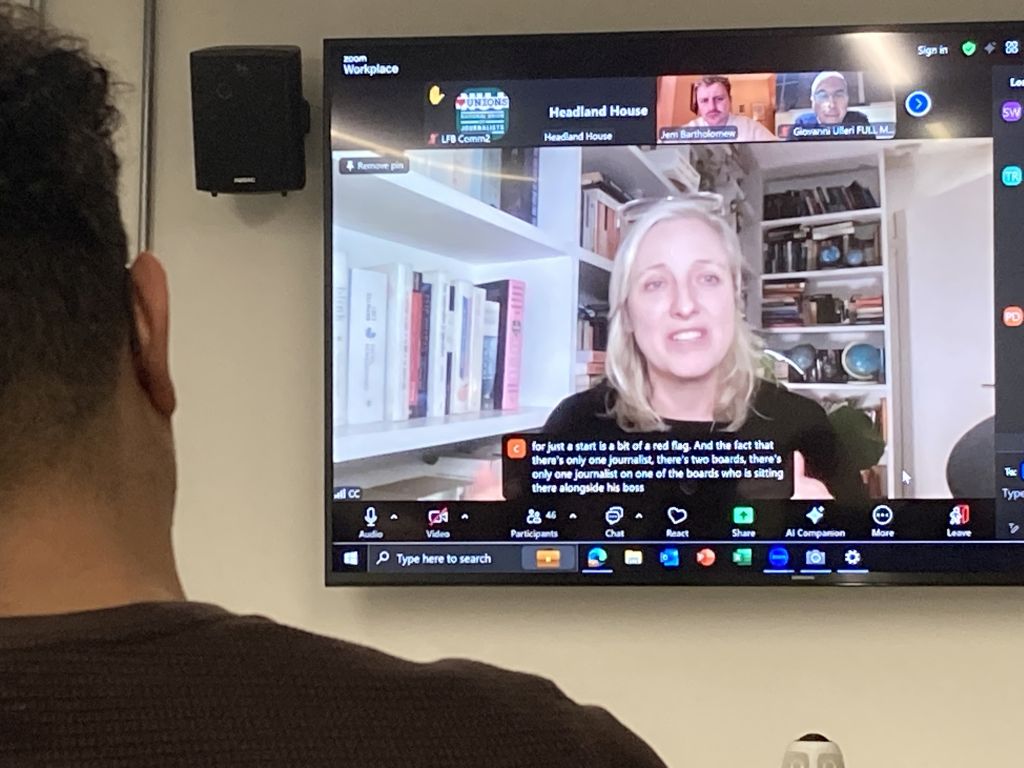Tortoise trouble
AT THE March Branch meeting veteran investigative journalist Carole Cadwalladr told us how her 20-year contract with the Observer and the Guardian was terminated during the Observer’s transfer to Tortoise Media.

Carole Cadwalladr on screen
“My great claim to fame is that I managed to get sacked twice in one day, which even by my own standards was quite impressive. I got terminated by the Guardian with my great ‘f**k you’ letter from them and on the same day I got a ‘f**k you’ letter from Tortoise, in which they said: ‘we’re writing to everybody today... as you know, we’re taking responsibility for the freelances and we’re writing to everybody today to issue them with new contracts… apart from you.’
“I’m laughing about it, but I do represent the interests of the freelance workers. NUJ head office and the Guardian chapel were very engaged in terms of the mitigations, and one was that all freelances would be offered contracts.
“I’m essentially a fake freelance. I haven’t been part of this group [London Freelance Branch] because I worked full-time for one organisation, and have done for 20 years, and that’s where the entirety of my income has always come from.
“But my interests haven’t been represented by the [Guardian] chapel, as I’m outside the house agreement. It’s deliberately set up to ensure that there’s this division, which is obviously unfair and unequal and, we believe, unlawful – deliberately set up to keep everybody in a weakened state and to avoid solidarity.
Freelances and the strike
“One of the amazing things about the November Guardian/Observer strike was that it brought people together and made everybody aware of the different issues across the organisation. We fought very hard against this so-called transfer.
“It was very much my decision to speak up. I felt an obligation because the readers didn’t know anything at all, and nobody currently employed felt able to.
“But in my case, I have a direct relationship with the readers because when it came to being sued, it wasn’t the Guardian who supported me: it was the crowdfunder from the readers, so I spoke up – and I’m still happy I did that.
“It’s the so-called freelances and casuals, the zero-hours workers who are the most precarious.
“Some of the photographers have worked for 35 years on contract for the Guardian and made themselves available to work every single day.
Questions over Tortoise
“I wrote an article about Tortoise’s financial interests and the companies that it was involved with. There are two principal concerns. The first is that the Tortoise business model is not viable in our view.
“Tortoise has about 70 employees. It’s taking over 40 full-timers from the Observer, plus 20 contractors, plus casuals, plus it’s advertising for more. It’s got this new investment of £25 million and its only real source of revenue is going to be from the sales of the print Observer – and it’ll have a wage bill of, what, seven or eight million a year?
“That’s very precarious. Tortoise is saying it’s going to get 170,000 paying subscribers in three years off a new website with no existing traffic and a paywall. To put that into context, the Daily Mail has just hit 100,000 paying subscribers off a website with 18 million traffic, so this doesn’t look good.
“The second aspect is that we still don’t know who the main investors are. We had this big showdown meeting, and were told they would email a list. That list never came.
“I wrote that the [Tortoise] model is essentially corporate-washing. They draw money from a range of big corporates, put on events which look like journalistic events, but make no differentiation between their journalistic product and their paid-for product.
“If you’re coming from the Guardian, where they make a big song and dance of how they ‘don’t take fossil fuel money’... Tortoise have something called the ‘responsible energy forum’ and, as somebody said, ‘if you put “responsible” in front of something you know it’s definitely not.’ It was sponsored by the PRs for the Saudi oil company Aramco and on their advisory board were two individuals who were on the board of Rosneft, the Russian oil company that sued the journalist Catherine Belton. Fundamentally it comes down to the lack of transparency. Be upfront. Let everybody know.
“Lots of people like Tortoise co-founder James Harding. He’s a great enthusiast and he’s run big organisations. But he is the sort of press baron we haven’t had in this country in a long time: he is both proprietor and editor. So there’s no firewall between commercial and editorial.
“Tortoise has been around for five years. It’s never made a profit. It’s never found a business model. The Observer became its shiny new plan.
The state of freelancing
“I’m sure there are lots of people here who’ve written for the Guardian and Observer and will know how little rates have gone up in 20 years. So, there’s a reliance in these organisations on freelance labour, while they run article after article about zero-hours and the gig economy…
“You can handle it when it’s the Spectator, but when it’s the Guardian, run on a regime of silence and fear, essentially, because people haven’t felt able to speak out because they know that’s going to get them branded as a troublemaker and they won’t get work...
“This whole business of having to take a month’s break every year, it’s there for one reason only, which is to deny workers their lawful rights.
“But the thing that really alarms me is there is a direction of travel in the Guardian and in all news organisations: AI is absolutely going to come for jobs hard and fast and that AI is being built off stolen labour.”
![[Freelance]](../gif/fl3H.png)